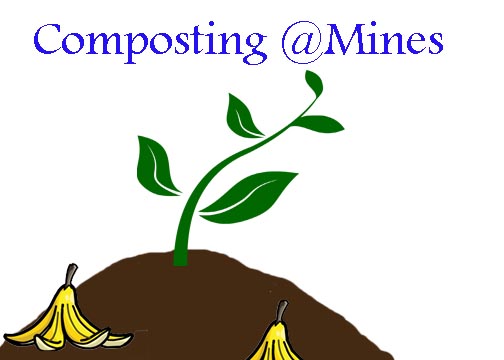At a town hall on October 23rd, Mines Sustainability and members of the Mines community addressed campus-wide efforts to reduce campus environmental impact, promote sustainable campus development, and reduce campus greenhouse gas emissions. One exciting project involves introducing and improving composting throughout campus. In a landfill, food waste produces methane gas as it breaks down and carbon dioxide when allowed to decompose with other compostable materials. According to the EPA, our landfills contain up to 20% discarded food, and considering that methane is 20 times more potent than carbon dioxide as a greenhouse gas, accurate waste diversion is vital to reducing greenhouse gas emissions. Additionally, food waste becomes valuable, nutrient-rich soil when turned into compost and can be used to grow high-quality food. In 2019, Mines utilized the company EcoCycle for large events and achieved an impressive 3,907 lbs of waste diversion and prevented 9,118 lbs of greenhouse gas emissions during E-Days, I-Days, and summer barbeques.
Now, a large organic dumpster sits behind the Student Center that is picked up by the recycling and composting provider for Golden, Green for Life International (GFL), and is part of the food audit being conducted on Mines Market. Only back-of-the-house scraps are diverted currently, but Sustainability Coordinator Lauren Poole hopes that front-of-the-house scraps can start being diverted as well starting in the spring. College campuses across the country struggle with composting due to a lack of education among their student bodies on what is compostable and what is not, leading to poorly-sorted waste that providers are hesitant to take. The issue of contamination has been exacerbated by traces of COVID-19 that can linger on materials and potentially endanger the people who process compost and recycling. Providers have also been hesitant to take compost from us since some of the compostable cups, plates, and other materials used in Mines Market and around campus do not seem to break down as well as would be preferred.
There are multiple groups of students who have researched or are currently researching composting-related topics. One group in the Sustainability/Smart Environmental Design Studio (SEDS) working with Dr. Leslie Light is researching composting in Mines Park, partnering with another team designing a greenhouse for a plot there that could potentially help feed the Mines community and use some of the produced compost. Groups working with Dr. Amy Landis are researching food waste here and on other college campuses, and the feasibility of anaerobic digestion for energy production from food waste. Despite the intricacies and challenges surrounding composting, plans to improve waste division across campus push on.

